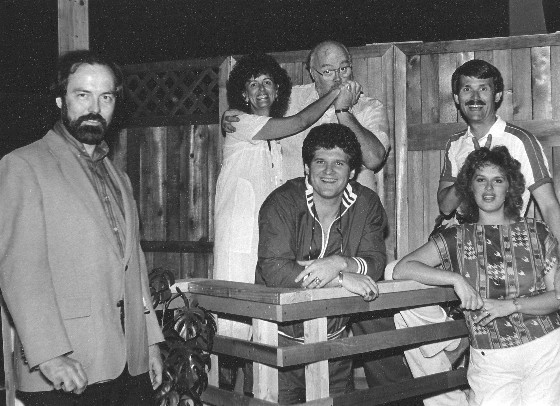
- From Left Front: Ken McDonald: (Peter Sachs) Gary Morean: (Leo Simpson) LeeAnne Dugan: (Nora DeVreck)
- Back: Micki Colwell: (Carrie Sachs) .Bill Davis: (Director) Art Blauvelt: (Oliver DeVreck)
Driftwood Players
"Lunch Hour" Sept. - Oct. 1984
By Jean Kerr, Directed by Bill Davis Assistant Director Jan Wolfe

|
|
|
|
|
|
|
|
|
From The Daily World
What to do when one's wife/husband wanders astray with someone else's husband/wife? Storm out and file for divorce? Slam the bedroom door and sulk? Go on a mammoth shopping spree?
Those may be possible ways to deal with a potentially heartbreaking situation, but for the purposes of "Lunch Hour," playwright Jean Kerr decreed that her characters should fight fire with fire.
That decision turns potential heartbreak into a lot of laughs in the Driftwood Players production at the playhouse in Aberdeen on Friday and Saturday nights through Oct. 13.
The comedy effect is thanks in large measure to Micki Colwell's portrayal of the zany wronged wife Carrie with her hilariously-warped sense of logic.
Gary Morean earns many laughs, too, as the dramatic landlord of the summer cottage (a delightful set, by the way) where the action takes place.
Art Blauvelt is charming as the vague, harried marriage counselor who does a turnaround to bring back his wife, played by Lee Anne Dugan, and Ken McDonald displays the low-key arrogance proper to his role as an hereditary millionaire.
From The Daily World, Saturday, September 15, 1984
When the play's the thing, those behind the scenes -- building sets, installing lighting and tending to details -- are more than helpers. They are vital.
The Driftwood Players, like other theater groups, are dependent upon their backstage people. But when productions such as this fall's opener, Lunch Hour, have a handful of players, the role of the backstage folks becomes more obvious.
"Will Nora really run off with Peter? Will Carrie get Peter back? Will Oliver get his book to the printer?" asks the Driftwood Players' announcement of Lunch Hour in this season's flyer.
To paraphrase that:
"Will the sets work? Will the lighting help? Will the cast move through the play with grace? Will the play come off?"
Once upon a time, in high school drama or literature classes, most of us were told that a play depends upon a "willing suspension of disbelief." Providing the audience with a new piece of reality, a place in never-never land, is the function of the whole company, says Bill Davis, Lunch Hour's director.
Here are some of those who are helping put together the delightful comedy for its Sept. 21 opening:
• Anita McMillan serves as "the book," or prompter. As the actors move from plowing cautiously through their lines to almost having each moment down pat, she follows the play in written copy.
"Line?" asks a player. The "book," in an even, non-judging tone, speaks the line from the first row. The task requires concentration and an even disposition.
• Doug Sipe. A workhorse, Sipe moves through the set even as the play is rehearsed. He adjusts the construction, the structure of our disbelief.
The set must be safe, sturdy and free from things that will disrupt our eye or the players' movements.
• Jan Wolfe. Stage managers must anticipate problems in the flow of a production, see the little gremlins that will spring up and bite the production at an unexpected moment.
She also works with lighting, the tricky mystery of a device, an artifice as vital as the set.
• Connie Miller. The prop mistress oversees those details that may seem unimportant in early rehearsal but have the capability of jarring an audience. Also helping with wardrobe, she must be sure that everything is available and ready to be picked up, thrown or moved.
Perhaps only the critical see the furnishing made after the play's time frame, but many will be distracted from the lines and the acting if the props don't fit.
• Sue Keltner. Ticket coordinators provide the funds to keep any theater going. It's a job that's easily forgotten, until it's time to pay the bills.
• Bill Davis. The director usually isn't mentioned in a summary of a company's "backstage" people. But in a small troupe, the director's function becomes more apparent. Not only does the director have final responsibility for transporting us to another place and time, he must make the atmosphere right. There's a blend of support and encouragement that goes with the firm hand of making the production work.
Davis doesn't berate. But he prods and cajoles, moving the group from a gang to an organized machine.
Home Driftwood Players Inc. Webmaster Larry Tingwall